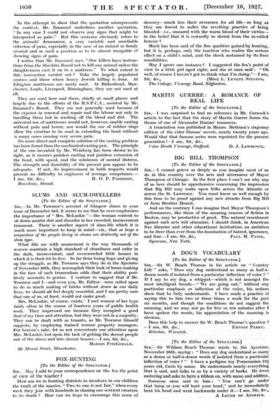SLUMS AND SLUM-DWELLERS [To the Editor of the SPECTATOR.] Sus,—In
Mr. Townroe's account of Glasgow slums in your issue of December 3rd, it seems to me that he over-emphasizes the importance of "Mrs. McLusIde "—the woman content to sit down amidst dirt and disorder in her crowded, inconvenient tenement. There is another aspect of slum-life which it is much more important to keep in mind—viz., that so large a proportion of the people living in slums are distinctly not of the slum type.
What fills me with amazement is the way thousands of women maintain a high standard of cleanliness and order in the dark, inconvenient, and overcrowded little houses in which it is their lot to live. So far from losing hope and giving up the struggle, as Mr. Townroe says they do in the Spectator of November 26th, they accomplish their task of home-making in the face of such tremendous odds that their ability posi- tively amounts to genius. I venture to suggest that if Mr. Townroe and I—and even you, Mr. Editor—were called upon to do as much making of bricks without straw in our daily lives, we should all feel deeply resentful, and I am pretty sure that one of us, at least, woiild not Make good: Mrs. McLuskie, of course, exists.- I met women of her type fairly often in the course of fourteen years of public health work. They impressed me because they occupied a good deal of my time and attention, but they were not in a majority. They can be dealt with as tenants, as Mr. Townroe himself suggests, by employing trained 'women property managers. For heaven's sake, let us not concentrate our attention upon Mrs. McLuskie, but upon the task of getting the decent people out of the slums and into decent houses.—I am, Sir, &e., 20 Mount Street, Manchester.
MARION FITZGERALD.










































 Previous page
Previous page